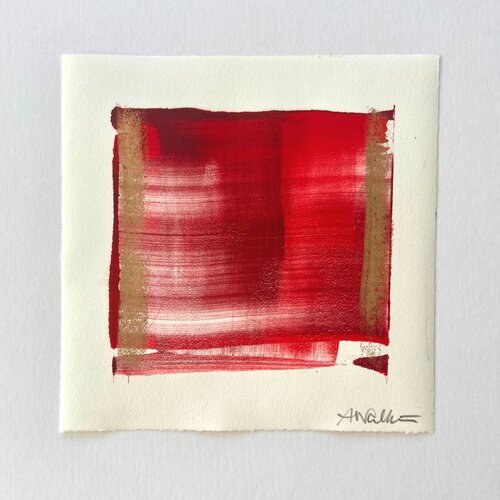 Image 1 of
Image 1 of


Aeneid #3
Monotype print (linseed oil ink) and oil pastel on BFK Rives paper
8 x 8 inches
This is a piece about what we carry, what we set down, and what we let burn.
Virgil’s “The Aeneid” is a Greek Epic about Aeneas of Troy, a refugee prophesied to one day found a great civilization (Rome).
When the Trojan Horse arrives and Troy is set on fire, his entire family is fleeing the house except his father, who has hunkered down in the back room and told Aeneas to leave him behind, he’s old and will die soon anyway.
In a defining scene, Aeneas puts his old, wrinkled father on his shoulders and runs through the burning city. He is carrying the traditions of the Trojan fathers on his shoulders through the flames. Once outside and safe, his father does eventually die anyway. Not letting the traditions of his elders burn made him worthy to found Rome, but not having to carry their weight forever made him able to found Rome.
How do we balance tradition and newness to build great civilizations… or just our lives? How we balance it defines us.
Monotype print (linseed oil ink) and oil pastel on BFK Rives paper
8 x 8 inches
This is a piece about what we carry, what we set down, and what we let burn.
Virgil’s “The Aeneid” is a Greek Epic about Aeneas of Troy, a refugee prophesied to one day found a great civilization (Rome).
When the Trojan Horse arrives and Troy is set on fire, his entire family is fleeing the house except his father, who has hunkered down in the back room and told Aeneas to leave him behind, he’s old and will die soon anyway.
In a defining scene, Aeneas puts his old, wrinkled father on his shoulders and runs through the burning city. He is carrying the traditions of the Trojan fathers on his shoulders through the flames. Once outside and safe, his father does eventually die anyway. Not letting the traditions of his elders burn made him worthy to found Rome, but not having to carry their weight forever made him able to found Rome.
How do we balance tradition and newness to build great civilizations… or just our lives? How we balance it defines us.
Monotype print (linseed oil ink) and oil pastel on BFK Rives paper
8 x 8 inches
This is a piece about what we carry, what we set down, and what we let burn.
Virgil’s “The Aeneid” is a Greek Epic about Aeneas of Troy, a refugee prophesied to one day found a great civilization (Rome).
When the Trojan Horse arrives and Troy is set on fire, his entire family is fleeing the house except his father, who has hunkered down in the back room and told Aeneas to leave him behind, he’s old and will die soon anyway.
In a defining scene, Aeneas puts his old, wrinkled father on his shoulders and runs through the burning city. He is carrying the traditions of the Trojan fathers on his shoulders through the flames. Once outside and safe, his father does eventually die anyway. Not letting the traditions of his elders burn made him worthy to found Rome, but not having to carry their weight forever made him able to found Rome.
How do we balance tradition and newness to build great civilizations… or just our lives? How we balance it defines us.